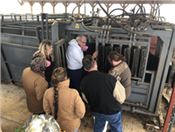|
Arkansas Native Uses Artificial Insemination To Help Improve State's Cattle Industry

Charles Looney, professor and extension cattle improvement specialist, conducts a demonstration of cattle breeding techniques.
Photo courtesy of Kimberly Rowe
FAYETTEVILLE, ARK.
One Arkansas native is looking to improve the state’s cattle industry through artificial insemination and is working to break the stigma around it.
Charles Looney, now professor and extension cattle improvement specialist for the University of Arkansas System Division of Agriculture, returned to Arkansas in October 2018 to help improve the genetics of cattle in the state.
Looney works out of the division’s Southwest Research and Extension Center near Hope, where two AI programs have been hosted in April and June. The programs focus on the ins and outs of artificial insemination as well as record keeping, identifying top bulls, vaccinations and more.
“The AI program is another avenue in which we are trying to educate the masses about cattle management and focus on reproduction,” Looney said. “Reproduction of the cow herd is one of the most important functions of a ranch and it is not focused as much as it should be.”
Cattle is one of the state’s top commodities. In 2016 cattle/calves racked up $489 million in cash receipts for Arkansas, according to the Economic Research Service of the U.S. Agriculture Department.
Despite having been around for decades, AI is not regularly used due to perceived costs and increased labor associated with it, Looney said. In addition, AI requires cattle handling facilities such as chutes for injections, and insemination. However, many of the AI companies can provide this equipment in portable facilities if needed.
“AI is an underutilized technology, primarily because of the labor it requires,” Looney said.
The injections, implants, time and more that go into the AI process are being covered during the programs with the help of companies such as Select Sires. Russell Womack of Hope is an independent breeding service representative for Premier Select Sires which helps with the programs.
Womack is trained to prepare and select females to enter successful AI projects, and to help and assist producers in management practices and sire selection to help them meet their goals in the beef industry.
“Select Sires has bulls available to improve or balance the weakness of one existing herd, such as calving ease, weaning weights, disposition, milking ability and carcass merit,” Womack said.
Using AI helps with earlier breeding and calving and in turn, a higher weaning weight for calves. AI also allows breeders to choose the bull that will be used, a cheaper and more effective option. This allows breeders to choose bulls with the best genetics.
“Looney’s program helps producers realize how beneficial it is,” Animal Science Department Head Mike Looper said. “When you look at the quality from AI, it generally costs less than natural mating.” ∆
|
|